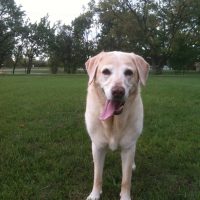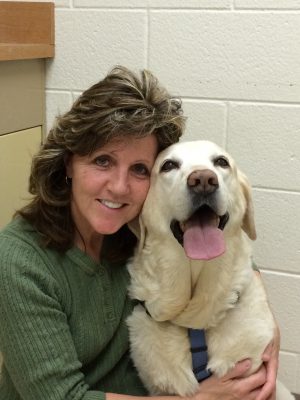My yellow lab Shanti started rehabilitation at MSU in February 2015, after she was diagnosed with Geriatric Onset Laryngeal Paralysis and Polyneuropathy, or GOLPP. GOLPP is a progressive neurodegenerative disease much like ALS, and there is no cure.

At MSU, we learned that Shanti’s larynx had become completely paralyzed from GOLPP, and she was at risk for her airway completely collapsing. Dr. Bryden Stanley performed a unilateral tie-back procedure, where a small cartilage in her larynx was fixed into an open position.
After the procedure, Shanti was able to start exercising. But because she was weak from the time she hadn’t been able to be active, we brought her to the MSU Veterinary Rehabilitation Service. The first step was hydrotherapy and cold laser treatment. Genia Smith, the veterinarian technician, also showed me exercises to do with Shanti at home to improve Shanti's strength and coordination.
During the summer, I continued to do strength and conditioning exercises with Shanti at home, and she continued to improve. When fall came, I wasn't able to spend as much time with her, and she began growing weak again. Due to the progression of GOLPP, her muscles were atrophying. This increased her hind-end weakness and lack of coordination. She began needing help getting up the four steps to the house. I knew Shanti needed skilled physical therapy.
In October of 2015, Shanti returned to MSU for rehabilitation. Dr. Sarah Shull, with the help of veterinary technicians Naomi and Becky, evaluated Shanti and worked out a program for her. The program is designed to strengthen and maintain her muscle mass, as well as help Shanti become more aware of where her limbs are in space. This helps her know where to place her feet, especially when going up steps.

After a few weeks, Dr. Elizabeth Carr was brought in to do electroacupuncture. I could immediately tell the difference. The results have been amazing. Shanti is more energetic, her muscles are more relaxed, and she just seems happier. After each therapy session, Shanti's strength and coordination are so much better. She has become a bit stronger and wants to be more playful. Her overall strength and coordination have greatly improved.
I know that GOLPP is a progressive neurodegenerative disease, but the rehabilitation team has given my Shanti a better quality of life. They are keeping her as strong as they can, and will do that for as long as possible. I feel blessed that I can bring Shanti to such a great facility and work with such incredibly knowledgeable people. And it touches my heart to know how much they all really love Shanti too.
Forever grateful,
Keli Williams RN
